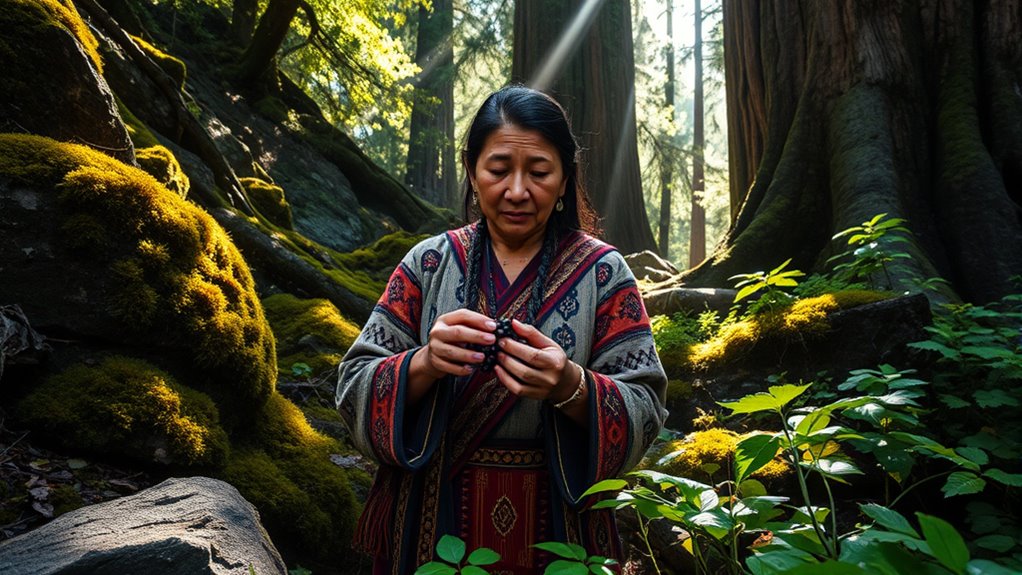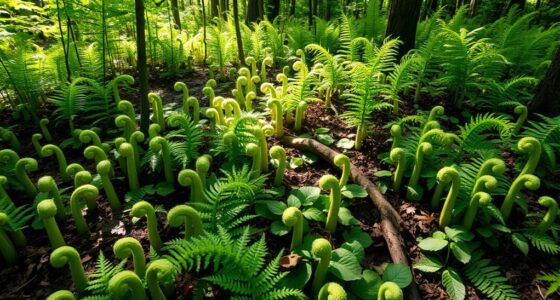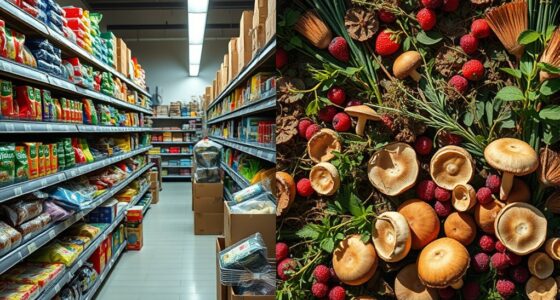Respectful foraging rooted in Indigenous knowledge involves honoring sacred sites, seeking permission, and following cultural protocols. It emphasizes sustainable harvesting methods, such as taking only what’s needed and respecting land boundaries. Building relationships with Indigenous communities and understanding their traditions helps preserve ecological balance and cultural heritage. By practicing mindfulness and showing respect, you support conservation efforts and deepen your connection with nature and Indigenous wisdom. Continuing your exploration uncovers more ways to honor these timeless practices.
Key Takeaways
- Obtain permission and follow rituals or taboos before foraging to respect cultural protocols.
- Respect sacred sites and land boundaries to preserve spiritual and cultural significance.
- Practice sustainable harvesting by selecting mature plants and harvesting seasonally to protect ecosystems.
- Engage with Indigenous community leaders and participate in cultural ceremonies to foster trust and understanding.
- Share knowledge responsibly, ensuring it is done with consent and in a way that supports cultural preservation.
The Wisdom Behind Indigenous Foraging Traditions
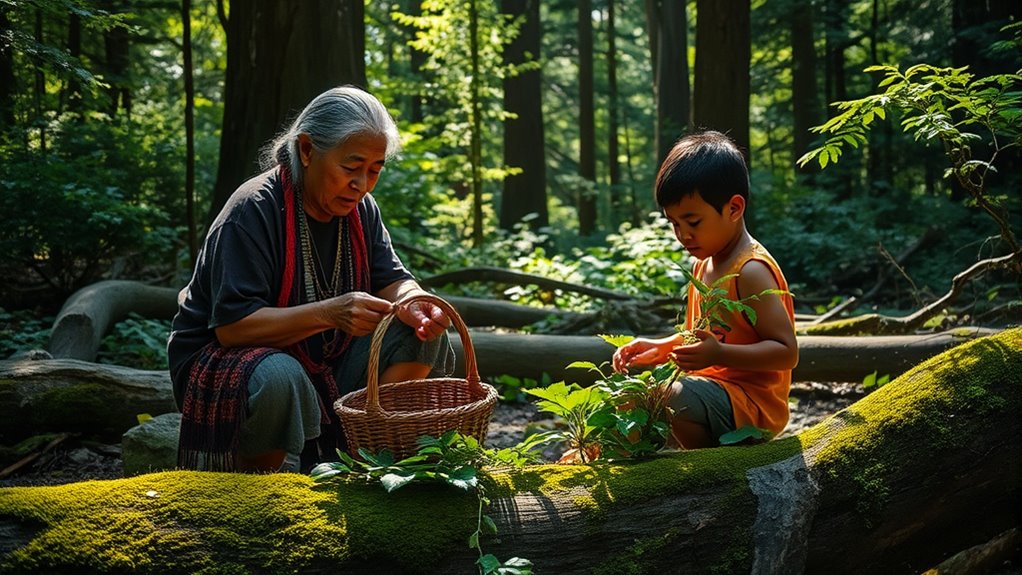
Indigenous foraging traditions are rooted in centuries of knowledge passed down through generations, emphasizing harmony with nature. You learn that traditional storytelling plays an essential role in preserving this wisdom, sharing stories about sustainable harvesting and respecting the land. Cultural ceremonies often feature foraging practices, reinforcing community bonds and honoring natural resources. These practices are rooted in a deep understanding of local ecosystems, ensuring resources are used responsibly. By participating in storytelling and ceremonies, you connect with ancestors’ teachings, gaining insight into when and how to forage without harming the environment. This knowledge isn’t just about gathering food; it’s about respecting the land’s balance, ensuring its vitality for future generations. Developing a deep ecological understanding helps you appreciate the intricate relationships within ecosystems and supports sustainable foraging practices. Your role is to carry this tradition forward with reverence and mindfulness.
Understanding the Ecological Significance of Indigenous Practices
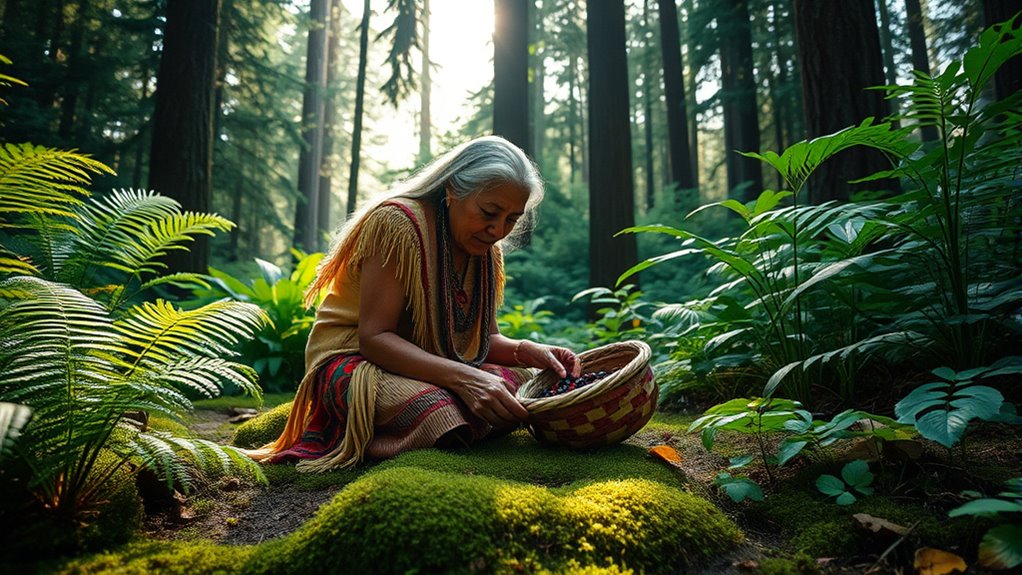
Understanding the ecological significance of traditional foraging practices reveals how these methods maintain environmental balance. Indigenous practices are rooted in traditional ecological knowledge, which promotes sustainable harvesting and biodiversity preservation. These methods help prevent overexploitation, ensuring resources remain available for future generations. Cultural preservation plays a crucial role here, as it connects communities to their environment and sustains their way of life. To illustrate this, consider the following table:
| Practice | Ecological Impact | Cultural Preservation |
|---|---|---|
| Selective harvesting | Protects plant populations | Reinforces traditional knowledge |
| Seasonal foraging | Maintains ecosystem cycles | Upholds cultural routines |
| Respect for sacred sites | Prevents ecological disturbance | Preserves spiritual connections |
| Rotational use | Prevents resource depletion | Supports community stewardship |
| Knowledge sharing | Promotes ecological resilience | Strengthens cultural identity |
These practices exemplify how indigenous knowledge sustains ecological health while preserving cultural heritage. Additionally, understanding and applying these practices can enhance environmental sustainability, ensuring that natural resources are managed responsibly.
Recognizing Sacred Sites and Cultural Boundaries
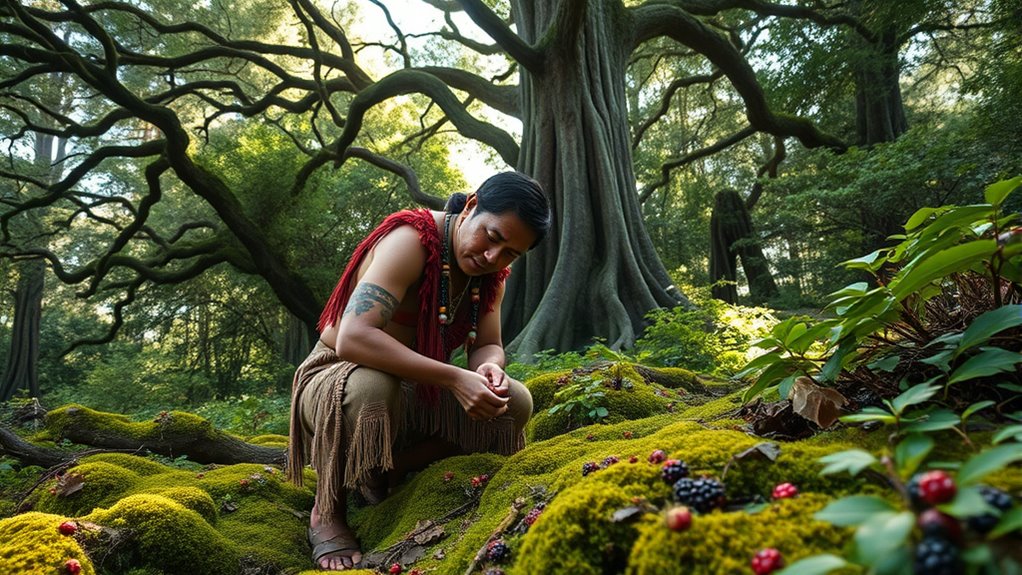
Recognizing sacred sites and cultural boundaries is essential for respecting indigenous communities’ connection to their land. Sacred site recognition involves understanding which areas hold spiritual or cultural significance and avoiding disturbance. By respecting these sites, you honor the community’s traditions and spiritual practices. Cultural boundary respect requires acknowledging the limits set by indigenous peoples around their territories, preventing encroachment or overreach. Pay attention to local signs, ask for guidance, and observe respectful distance. Remember, these boundaries are crucial for maintaining cultural integrity and preserving sacred spaces. When you approach foraging activities, always prioritize these considerations. Showing awareness and sensitivity demonstrates your commitment to honoring indigenous knowledge, fostering trust, and supporting the preservation of their cultural heritage. Additionally, understanding the foraging guidelines can help ensure sustainable and respectful harvesting practices.
Traditional Knowledge of Edible and Medicinal Plants

You can learn a lot about local ecosystems by understanding indigenous uses of plants for food and medicine. Sharing ethnobotanical knowledge helps preserve traditions and promotes respectful foraging. By respecting harvesting practices, you honor the cultural significance of these plants and support their sustainability.
Indigenous Plant Uses
Have you ever wondered how Indigenous communities have harnessed local plants for both food and medicine? They use plants in traditional recipes and herbal remedies, passing down knowledge through generations. You might imagine gathering wild herbs, roots, and berries, then transforming them into nourishing meals or healing potions. These plant uses include:
- Cooking with wild greens and tubers
- Brewing teas from native herbs for ailments
- Preparing salves from bark and leaves
- Using berries in preserves and snacks
- Infusing oils with medicinal roots
Each practice reflects a deep understanding of the land’s offerings, ensuring respect and sustainability. Indigenous plant uses highlight a harmonious relationship with nature, where every leaf and root serves a purpose in daily life, preserving cultural heritage and health. Traditional knowledge guides these practices, emphasizing the importance of respecting and maintaining ecological balance.
Ethnobotanical Knowledge Sharing
Ethnobotanical knowledge sharing plays a crucial role in preserving Indigenous communities’ understanding of edible and medicinal plants. When you learn and pass down this knowledge, you help maintain cultural preservation, ensuring traditions remain alive. Sharing often occurs during storytelling, communal gatherings, and traditional ceremonies, reinforcing the importance of plants in your culture’s spiritual and practical life. This exchange of information helps protect valuable plant uses from being lost over generations. It also fosters respect for the environment and encourages sustainable practices. By actively participating in knowledge sharing, you keep alive the intricate connection between people and plants, safeguarding your community’s heritage. Ultimately, this process empowers you to honor your ancestors while passing on vital plant knowledge to future generations.
Respectful Harvesting Practices
When harvesting edible and medicinal plants, practicing respect for nature is essential to guarantee their sustainability. Indigenous communities often incorporate traditional storytelling and sacred ceremonies to honor these resources. Respectful harvesting includes selecting only what’s needed, never overharvesting, and leaving some plants untouched for regeneration. It also involves:
- Using gentle tools to minimize damage
- Leaving roots intact to promote regrowth
- Harvesting during specific seasons aligned with traditional knowledge
- Giving thanks through rituals or offerings
- Respecting sacred sites and respecting elders’ guidance
These practices reinforce the connection between people and nature, ensuring future generations can benefit. By approaching foraging with reverence rooted in storytelling and sacred ceremonies, you honor ancestral wisdom and sustain the ecological balance of the land. Incorporating predictive analytics can help communities better understand the optimal harvesting times to support plant regeneration and ecological health.
Sustainable Harvesting Methods Passed Through Generations
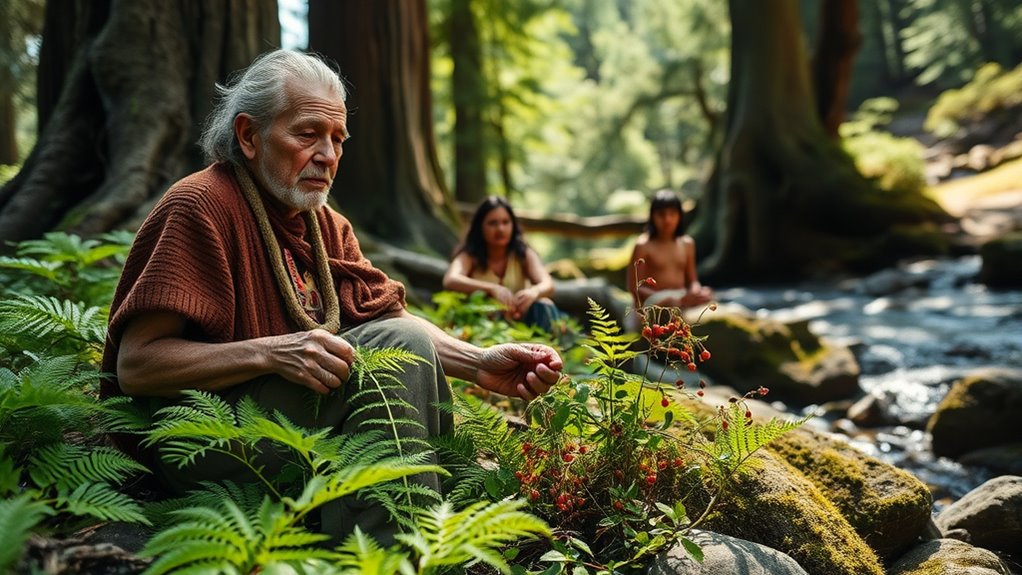
Generations of Indigenous communities have developed and refined harvesting techniques that prioritize the health of their ecosystems. You learn to use traditional tools carefully, minimizing damage to plants and soil. Seasonal rituals guide when and how you harvest, ensuring plants have time to regenerate. These practices foster sustainability and respect for nature’s balance. To illustrate, consider this table:
| Practice | Description | Impact |
|---|---|---|
| Using traditional tools | Handcrafted implements reduce harm | Promotes selective harvesting |
| Timing with seasonal rituals | Harvests aligned with plant cycles | Ensures plant renewal |
| Respecting plant maturity | Only mature plants are collected | Maintains population stability |
| Harvesting in moderation | Small quantities per season | Prevents overharvesting |
| Community sharing | Distributes resources fairly | Strengthens ecosystem health |
These methods pass wisdom across generations, ensuring sustainable foraging. Additionally, understanding the importance of emotional alignment can enhance our relationship with nature and community, fostering a deeper respect for the environment that sustains us.
Respecting Intellectual Property and Cultural Rights
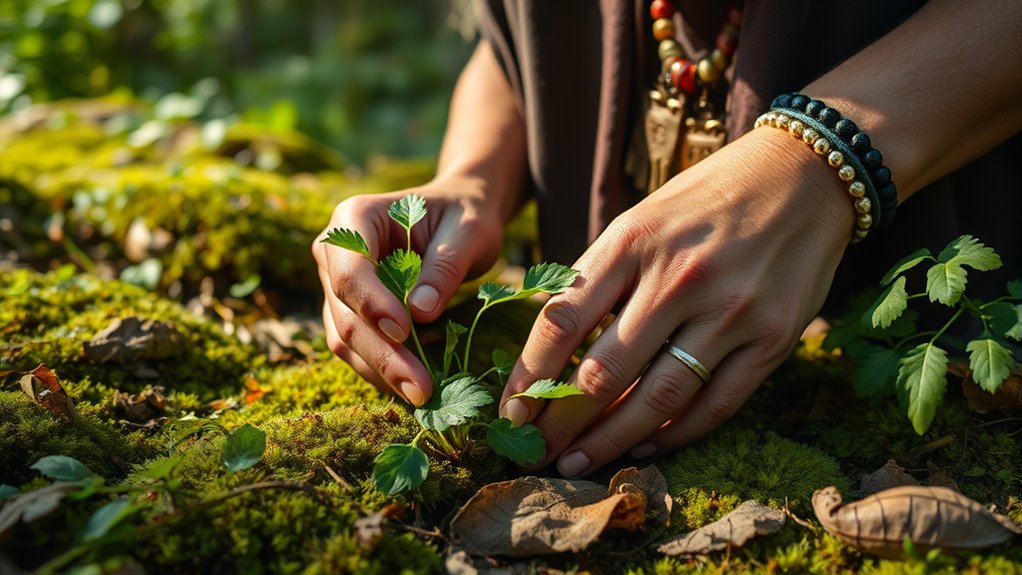
Respecting the intellectual property and cultural rights of Indigenous communities is a vital part of ethical foraging practices. It means acknowledging their ownership of traditional knowledge, stories, and resources that support their cultural preservation. To honor this, you should avoid exploiting or misusing Indigenous knowledge without permission. Imagine:
- Respecting sacred symbols and rituals
- Not claiming traditional knowledge as your own
- Seeking consent before sharing cultural information
- Supporting Indigenous-led initiatives
- Recognizing their rights to land and resources
Acknowledge the importance of cultural heritage in maintaining the identity and traditions of Indigenous peoples.
Building Relationships With Indigenous Communities
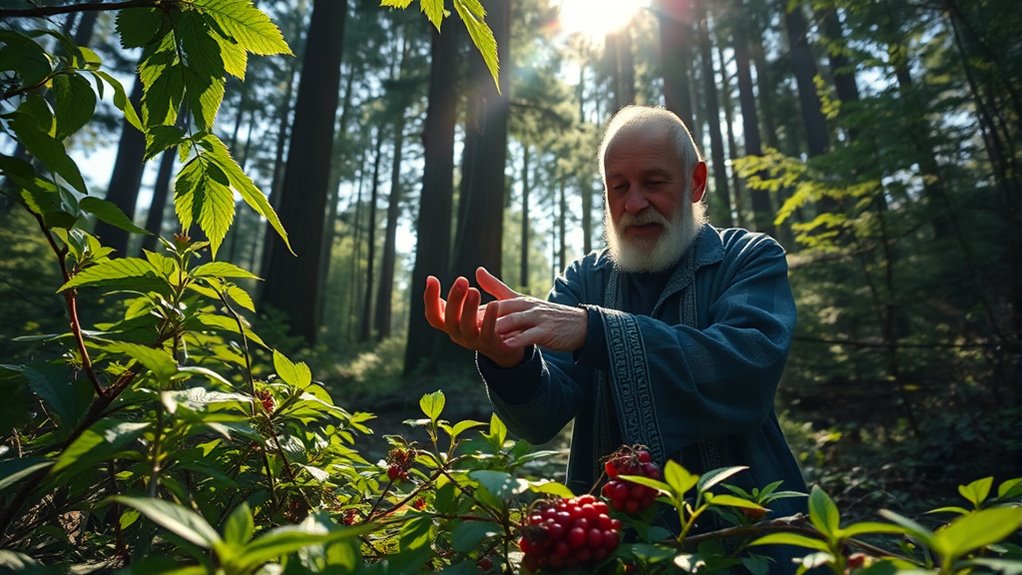
Building trust with Indigenous communities starts with engaging local leaders and listening to their perspectives. You should respect cultural protocols and seek permission before foraging or sharing knowledge. Supporting Indigenous initiatives shows your commitment to fostering genuine relationships and honoring their sovereignty. Recognizing the importance of cultural sensitivity is essential for respectful engagement.
Engage With Local Leaders
To foster meaningful connections with Indigenous communities, engaging with local leaders is essential. Building trust through community engagement opens doors for authentic cultural exchange. Reach out respectfully, listen actively, and show genuine interest in their perspectives. When you meet with local leaders, imagine:
- Sharing meals around a communal fire
- Participating in traditional ceremonies
- Listening to stories passed down through generations
- Volunteering your skills for community projects
- Attending local gatherings and events
These actions help you understand their values and practices, laying a foundation of mutual respect. By engaging sincerely, you create opportunities for ongoing dialogue and collaboration, ensuring your foraging respects their knowledge and traditions. Establishing trust and rapport is critical for maintaining respectful relationships and honoring their cultural practices. Building relationships with local leaders is key to fostering respectful, meaningful connections.
Respect Cultural Protocols
Understanding and honoring cultural protocols is essential when engaging with Indigenous communities, as these guidelines reflect their values and social norms. Respecting these protocols demonstrates your commitment to cultural preservation and builds trust. Indigenous communities often emphasize oral traditions, which carry their history and knowledge; listening carefully shows your respect for their language and stories. Avoid actions that might disrupt their customs or spiritual practices. Before foraging, ask permission and follow any specific rituals or taboos. By doing so, you show respect for their cultural heritage and foster positive relationships. Recognizing and adhering to these protocols not only honors their traditions but also enriches your understanding of their connection to the land and its resources.
Support Indigenous Initiatives
Respecting cultural protocols lays a strong foundation for genuine relationships with Indigenous communities. Supporting Indigenous initiatives shows your commitment to their sovereignty and well-being. Engage actively by participating in cultural ceremonies, which foster understanding and respect. Listen to traditional storytelling, allowing their history and values to deepen your connection. Collaborate on projects that promote indigenous rights and knowledge preservation. Be present at community events, offering your support without overshadowing their voices. By honoring their traditions and priorities, you help build trust and mutual respect, ensuring that your efforts contribute meaningfully to their empowerment and cultural continuity. Supporting Indigenous initiatives isn’t just about good intentions; it’s about fostering authentic relationships rooted in respect and shared purpose.
Challenges and Opportunities in Integrating Indigenous Knowledge
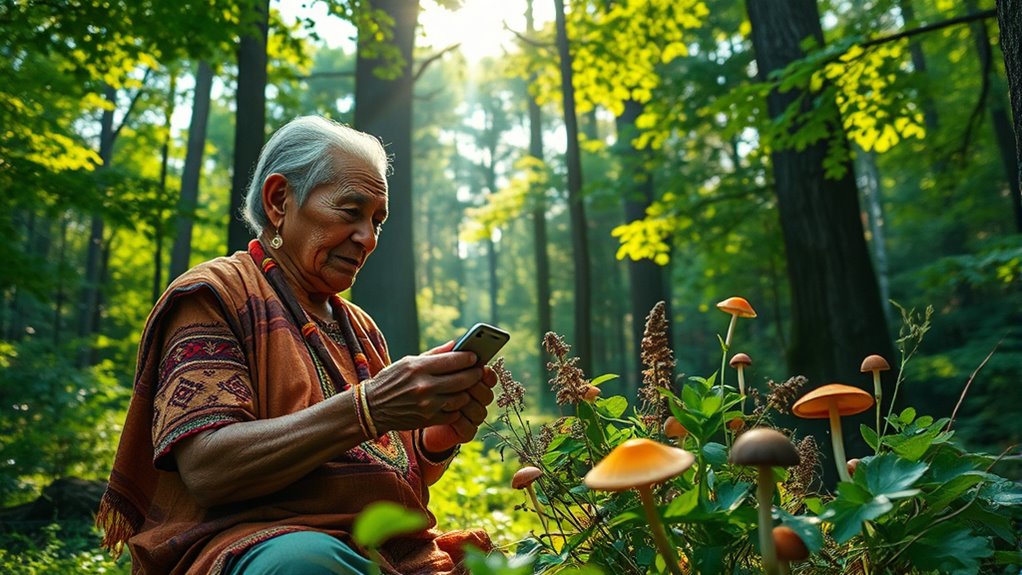
Integrating Indigenous knowledge into mainstream foraging practices presents both significant opportunities and complex challenges. One key challenge is ensuring the preservation of cultural identity, as knowledge transmission often relies on oral traditions vulnerable to disruption. Respectful integration requires careful navigation of intellectual property rights, avoiding cultural appropriation. You must recognize the importance of engaging Indigenous communities directly, giving them control over how their knowledge is shared and applied. Additionally, balancing scientific validation with traditional understanding can be difficult but essential for meaningful collaboration. Despite these obstacles, there’s a valuable opportunity to enrich conservation efforts and promote sustainable foraging methods. By fostering genuine partnerships, you can help safeguard cultural heritage while advancing ecological stewardship, creating a more inclusive approach that benefits both Indigenous communities and broader society.
Ways to Support Indigenous-led Conservation and Education
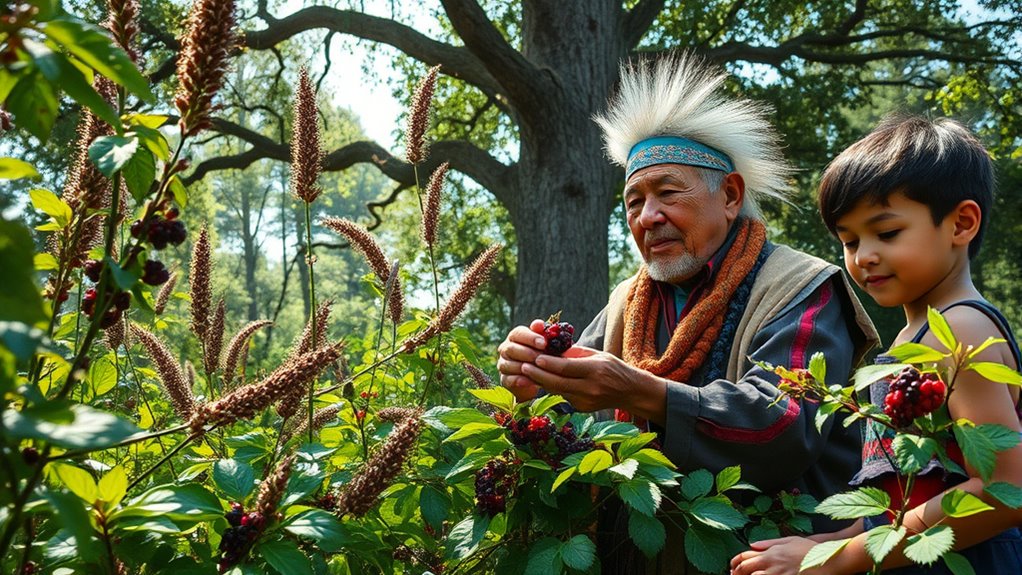
Supporting Indigenous-led conservation and education begins with amplifying Indigenous voices and priorities. You can do this by respecting their traditional storytelling, which preserves ecological knowledge, and participating in community ceremonies that reinforce cultural bonds. To support effectively, consider these actions:
- Attend Indigenous-led workshops on sustainable foraging practices
- Advocate for policies that protect Indigenous lands and rights
- Share stories that highlight Indigenous knowledge and success stories
- Volunteer with organizations that focus on cultural preservation
- Respect sacred sites and refrain from disrupting community ceremonies
Frequently Asked Questions
How Can I Respectfully Ask for Permission to Forage on Indigenous Lands?
When you want to forage on indigenous lands, you should approach with cultural sensitivity and follow proper permission protocols. Respectfully introduce yourself, explain your intentions, and ask for permission from the community or landowners. Listen carefully to their guidance, and be prepared to accept their decision. Showing genuine respect and understanding helps build trust and honors their connection to the land, ensuring your actions are responsible and considerate.
What Are the Best Ways to Learn About Indigenous Foraging Practices Ethically?
To learn about indigenous foraging practices ethically, you should prioritize cultural sensitivity and seek out opportunities to connect directly with community members. Respect traditional knowledge by listening and asking for guidance rather than assuming. Attend workshops or cultural events, read authentic sources, and always approach with humility. Building genuine relationships helps you understand the significance of foraging practices, ensuring your learning honors indigenous traditions and respects their rights.
How Do Indigenous Communities View Outsider Participation in Traditional Foraging?
You should recognize that indigenous communities often see outsider participation in traditional foraging as a sensitive issue. They value maintaining cultural boundaries and community sovereignty, which can be threatened by outside involvement. Respectfully engaging means seeking permission, understanding local protocols, and listening to community members. By respecting these boundaries, you help preserve their traditions and build trust, acknowledging their rights to control their knowledge and resources.
Are There Specific Symbols or Signs Indicating Sacred or Protected Foraging Areas?
Ever wonder how you can identify sacred or protected foraging areas? Many communities use sacred site symbols and protected area markers to communicate boundaries and spiritual significance. These symbols often appear on signs, markers, or natural features, guiding respectful foragers away from sensitive zones. Recognizing and honoring these markers shows your respect for cultural traditions and helps preserve the area’s integrity for future generations. Are you ready to forage responsibly?
How Can Non-Indigenous Individuals Support Indigenous Foraging Knowledge Without Cultural Appropriation?
You can support indigenous foraging knowledge by practicing cultural sensitivity and prioritizing respectful knowledge sharing. Respect signs or symbols indicating sacred areas and avoid entering restricted zones. Engage with indigenous communities through dialogue, ask for permission, and learn their traditions genuinely. By honoring their expertise and boundaries, you help preserve their cultural heritage while promoting respectful collaboration and understanding, ensuring their knowledge remains protected and valued.
Conclusion
By embracing indigenous knowledge with respect and reverence, you foster flourishing forests and fearless futures. Honor sacred sites, heed cultural boundaries, and help heal the land through sustainable, shared stewardship. Supporting indigenous-led conservation and education isn’t just a duty — it’s a powerful promise to preserve precious practices and protect our planet’s profound, cultural roots. Together, let’s nurture nature’s wisdom, nurturing a world where respect and resilience reign triumphant.

